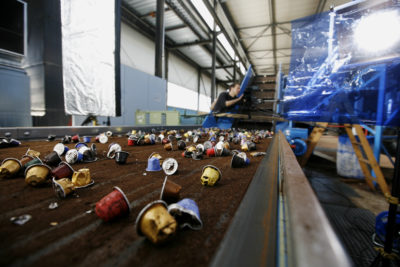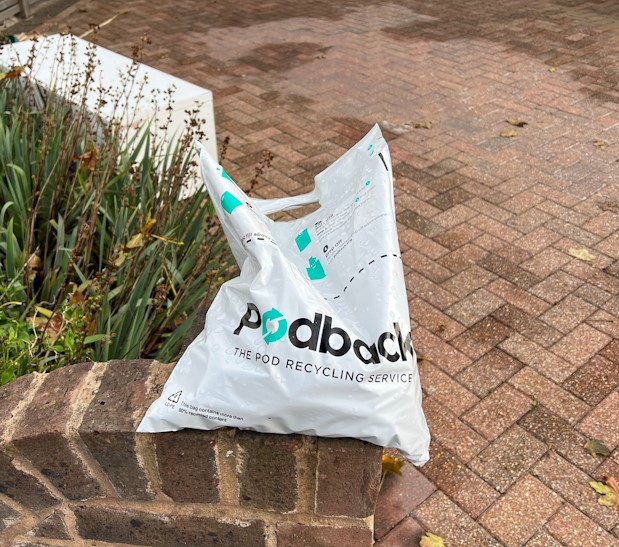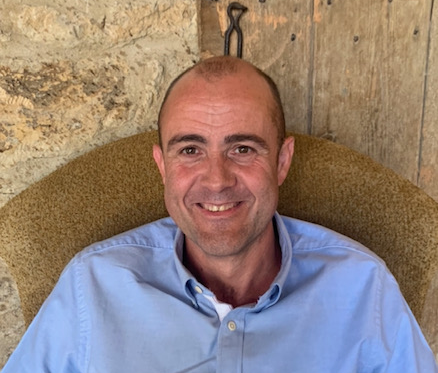OPINION: The UK Government has set ambitious municipal recycling targets – in line with those of the EU – of 55% by 2025, 60% by 2030 and 65% by 2035. To reach those recycling targets, and prevent the loss of valuable resources from the circular economy, we need to expand the collection of waste streams beyond those typically collected by local authorities at the kerbside.
These hard-to-recycle waste streams include batteries, textiles, light bulbs, waste electrical and electronic equipment (WEEE), cartons, films, crisp packets and many more. More often than not these are omitted from local authority recycling collection systems, as not only are they are generated in small volumes or infrequently, many sorting facilities are not equipped to separate them.

Separate collections are therefore the main available option for these materials, but the savings that councils would make on residual waste disposal are insufficient to make such collections economically viable. If householders want to recycle these materials, it usually requires a trip to a private collection point or household waste recycling centre, which – though better than nothing – yields lower capture rates than kerbside collection systems.
Kerbside collections would be the most convenient way for householders to recycle these items, but with local authorities strapped for cash, how are these collections to be funded?
Extended producer responsibility (EPR), which will see producers fund the full net cost of collection and management of their products at their end of life, is set to be introduced for packaging as part of the Environment Act from 2023, with the expectation of future mandatory schemes covering textiles and reforms to the existing schemes for batteries and electrical items beyond that. EPR schemes of this nature can provide a solution to a range of products that typically go uncollected by local authorities.
Coffee pods
At Eunomia, we’ve been involved in designing and implementing a non-statutory producer responsibility scheme for coffee pods, which could provide a blueprint for other hard-to-recycle waste fractions. Podback is a scheme established by a partnership of the country’s largest coffee-producing companies: Nestlé and Jacobs Douwe Egberts UK. Its objective is to facilitate a single recycling scheme for all plastic and aluminium pods, regardless of brand.

Coffee pods are a widely-used single-use luxury consumer good, with over 1.2 billion consumed in the UK every year, according to the Nielson Total Coffee database. These pods, made from aluminium and/or plastic, are not typically collected through local authority recycling systems due to their multi-material composition; used coffee pods would contaminate regular plastic and aluminium streams and be difficult for sorting facilities to separate out. Therefore, the introduction of an accessible recycling system to move the product up the waste hierarchy is critical.
The kerbside collections we’ve helped Podback design and deploy enable consumers to recycle pods just as they would paper, glass and plastics. To avoid a financial and operational burden for local authorities participating in the scheme, each authority is supported to introduce a tailored collections model that fits seamlessly with their existing collections system. Some councils collect pods in cages under recycling collection vehicles – such as in Cheltenham borough council – whilst others are on a separate pass – Chichester district council collects pods on a vehicle that also collects WEEE, batteries and textiles.
The kerbside collections we’ve helped Podback design and deploy enable consumers to recycle pods just as they would paper, glass and plastics
So far, the scheme has been successfully rolled out by six local authority partners. Supported by funding from the coffee brands behind the scheme, the pod collections are run efficiently and all material is sent for recycling. The aluminium and plastic pods are collected separately, processed and recycled. The coffee grounds are removed and processed by anaerobic digestion into digestate for soil improver. The plastic bags used to collect the used pods – which are made from recycled content – are also bulked and recycled.
Kerbside collections
There are still obstacles to overcome before kerbside collections of pods – and other materials – can be used as a widespread mechanism to increase recycling. Challenges that are specific to pods include their lightweight nature, which means that even when bulked, the haulage costs can be difficult to scale in a way that is economically appealing. More widely, kerbside collections from rural areas and from high-rise properties needs further development, particularly as these can pose problems for more widely established recycling streams.

Regardless of these challenges, this collection model has the potential to be a prototype for facilitating the increased collections and recycling of other hard-to-recycle waste streams. By involving producers in the collection of their products at their end of life, economic and convenient collection systems can be incorporated into existing local authority collections, providing accessible collection options for householders and keeping valuable resources in circulation.
Local authorities currently participating in the Podback scheme are Cheltenham borough council, South Derbyshire district council, Chichester district council, Oxford city council, Exeter city council and Ipswich borough council.
Current participating brands include Nespresso, Nescafé Gusto, Starbucks by Nespresso, Starbucks by Nescafé Dolce Gusto, Tassimo, L’OR, Cru Kafe, Artisan Coffee Co, Allpress Espresso, Colonna Coffee and Café Palmieri by Jomad Coffee.







Subscribe for free